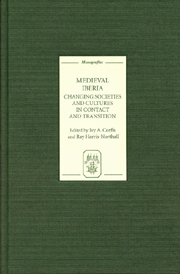Book contents
- Frontmatter
- Contents
- Acknowledgements
- Introduction
- Part 1 SOCIAL AND CULTURAL MINORITIES IN CHANGING SOCIETIES
- Part 2 CONTACT AND CONFLICT: PERSPECTIVES ON HISTORY AND CULTURE
- Visigoths and Asturians Reinterpreted: The Spanish Grand Narrative Restored?
- Against the Arabs: Propaganda and Paradox in Medieval Castile
- Conquest and Conversion in the Hispanic Chivalric Romance: The Case of Reinaldos de Montalván
- Part 3 TRANSMISSION OF LEARNING AND TEXTS IN CHANGING CULTURES
- Part 4 LINGUISTIC CONTACT AND CHANGE
- Index
Against the Arabs: Propaganda and Paradox in Medieval Castile
from Part 2 - CONTACT AND CONFLICT: PERSPECTIVES ON HISTORY AND CULTURE
Published online by Cambridge University Press: 12 September 2012
- Frontmatter
- Contents
- Acknowledgements
- Introduction
- Part 1 SOCIAL AND CULTURAL MINORITIES IN CHANGING SOCIETIES
- Part 2 CONTACT AND CONFLICT: PERSPECTIVES ON HISTORY AND CULTURE
- Visigoths and Asturians Reinterpreted: The Spanish Grand Narrative Restored?
- Against the Arabs: Propaganda and Paradox in Medieval Castile
- Conquest and Conversion in the Hispanic Chivalric Romance: The Case of Reinaldos de Montalván
- Part 3 TRANSMISSION OF LEARNING AND TEXTS IN CHANGING CULTURES
- Part 4 LINGUISTIC CONTACT AND CHANGE
- Index
Summary
The aim of this essay is to inquire into the issue of Christian propaganda and anti-Arab sentiment during the period of the Reconquest in Spain. This issue will be examined within the general context of the chivalric codes of ethics that characterized much of the medieval Castilian masculine discourse. Such discourse informed, or perhaps even controlled, the actions of the knights whose task it was to bring the Reconquest to a successful conclusion. I shall focus primarily on the fifteenth century. It was during this century, when the end of the Reconquest was clearly in sight, that anti-Arab propaganda became what could be called a literary common denominator, manifesting itself in venues as far apart stylistically as prose chronicles molded around sophisticated rhetorical infrastructures and ballads born of, and fueled by, the popular imagination.
I begin with the fifteenth-century chronicler Alfonso de Palencia. Palencia states in the prologue of his chronicle of the reign of King Enrique IV of Castile (1454–74) and succeeding years that his account is unique, for unlike other chronicles of Enrique's turbulent reign it is written not by a sycophant but by one who pursues and promotes the truth: ‘un cultor de la verdad’ (Palencia 2). What in fact distinguishes Palencia's chronicle from others is not so much the idea of veracity as the fact that Palencia fixes truth-telling firmly within the rhetorical frame of vituperative discourse.
- Type
- Chapter
- Information
- Medieval IberiaChanging Societies and Cultures in Contact and Transition, pp. 57 - 69Publisher: Boydell & BrewerPrint publication year: 2007



